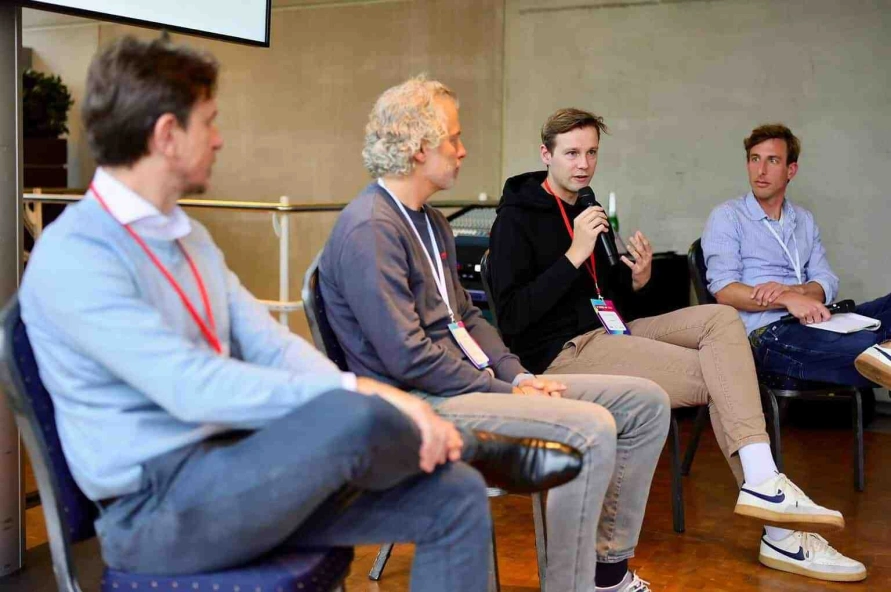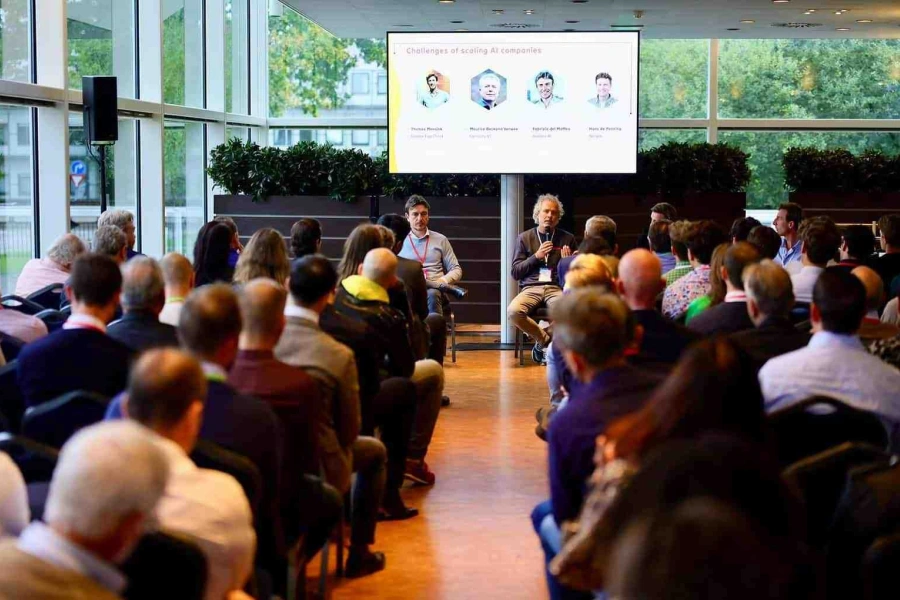Scaling a startup into a sustainable, larger enterprise is not easy, especially in the dynamic field of artificial intelligence (AI). During the LEVEL UP event on September 30 in Eindhoven, a panel discussion brought together industry leaders to talk about this. The discussion was moderated by Thomas Mensink from Golden Egg Check and included Fabrizio Del Maffeo, CEO of Axelera AI, Hans de Penning, co-founder and CEO of Neople, and Maurice Beckand Verwee, partner at Curiosity VC. Together they shared their insights on scaling AI startups, financing, and creating a solid company culture.
Opportunities and challenges
In his introduction, Hans de Penning explained that Neople is an employment agency for AI-driven digital workers. He emphasized that the company focuses on tackling real problems, a focus that has helped them secure funding from investors like Curiosity VC.
Maurice Beckand Verwee of Curiosity VC described his journey. He scaled his own companies and is now an investor. Curiosity VC focuses on pre-seed and seed AI companies in areas such as prop tech, fintech, and logistics. Fabrizio Del Maffeo, co-founder and CEO of Axelera AI, explained how his company is designing an AI hardware and software platform for implementing artificial intelligence in various devices. Axelera, which raised 68 million dollars this year, started as a stealth project that took 18 months to assemble the right team and align market opportunities.
Practical aspects
The conversation quickly turned to the practical aspects of scaling a business. Del Maffeo shared his experience. He talked about how the company grew from a small team to more than 180 people in just three years. A key factor in their success was recognizing potential in the market. However, scaling up meant they had to face challenges. For instance, they had to attract more capital. “You have to be a little crazy to embark on such an adventure,” said Del Maffeo, pointing out the importance of perseverance in seeking funding.
For Hans de Penning, scaling up meant choosing which market to conquer. Neople recently opened an office in Berlin. He emphasized the importance of building a strong team and a good company culture from the start: “Four people from our team now live in Berlin to build the culture from the ground up.”

Kom in contact met BOM


Seeking Investments
Financing is a crucial component of successful scaling. Del Maffeo noted that raising $68 million for Axelera AI involved proving to investors that their product was market-fit. For AI companies focused on hardware, finding investors willing to take risks can be quite challenging. Nevertheless, Del Maffeo emphasized, “Investors are looking for market traction – they are checking if customers are willing to buy your product.”
Maurice Beckand Verwee shared his vision as an investor. He emphasized the importance of thoroughly testing your idea before seeking money. “Founders can often gather a lot of evidence without immediately raising money,” he said. Curiosity VC uses a network of experts to assess whether investments are technically and market-wise suitable, so they only invest in companies with a solid foundation.
De Penning reiterated the importance of early customer validation, which helped Neople secure funding in the first year.
A Scalable Organization
Another topic was building a team and the right company culture. Del Maffeo revealed that Axelera AI began with a team spread across three countries. This helped attract talent. However, it also posed challenges in maintaining a cohesive company culture. To address this, Axelera ensures in-person meetings and encourages collaboration within the team.
De Penning spoke about how Neople scales its team and organization. He stressed the importance of building a solid foundation before further expansion. He advised other founders to carefully consider the timing of their steps.
Beckand Verwee underscored the need for iteration in company culture as a startup grows. “You need to continually adapt to new situations,” he said. He also pointed out that founders must be self-aware and evaluate if they are the right person to lead the company through various growth phases.
No VC Funding
A question from the audience: when should startups not seek VC funding? The panelists unanimously agreed that if a startup can grow without venture capital, it should consider doing so. “If you don’t need to raise money to build a business, then don’t do it,” advised De Penning. Del Maffeo added, “Ultimately, it’s about your plan and what you need to achieve it.”
This article was written in collaboration with and published on Innovation Origins, media partner of LEVEL UP.
